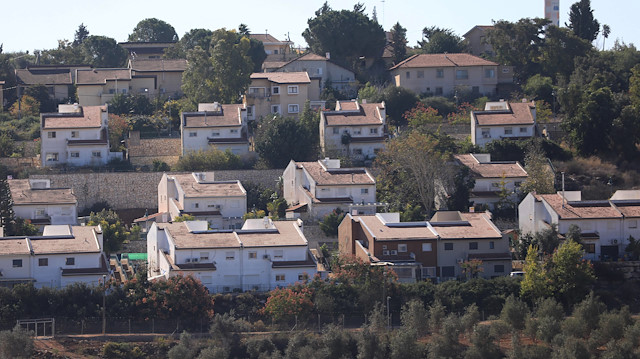

US: Israeli settlements don’t violate int’l law
Israeli settlements are main obstacle to two state solution of Palestine
Israel continues to build Jewish settlements on Palestinian territories, which it has occupied since 1967.
The presence of 262 Jewish settlements built in the West Bank and East Jerusalem stands as an obstacle against establishing a sovereign Palestinian state.
U.S. Secretary of State Mike Pompeo on Monday softened Washington’s stance on Israeli settlements, saying Washington would no longer consider them illegal, backpedaling from some four decades of U.S. policy.
In response to the controversial move, European diplomats on Wednesday re-stated long-held positions that Israeli settlement-building on Palestinian land was “illegal”.
With this latest decision, the U.S. has become the first country to accept Jewish settlements built on occupied Palestinian territories. This will encourage Israel to annex Jewish settlements in the West Bank.
The U.S. move also violates the UN resolution on Palestine.
In December 2016, the UN Security Council (UNSC) with its Resolution 2334, demanded that Israel stop immediately all settlement activities in the occupied Palestinian territories.
- 52 years of occupation
After Israel invaded the West Bank and East Jerusalem in 1967, it began building Jewish settlements in the region.
The Israeli government, led by the left-wing Labor Party, gave the green signal to a program for construction around East Jerusalem and its surroundings and eastern West Bank near the Dead Sea during the period 1967-1977.
The right-wing Likud Party, which took over the government, aimed to increase the number of Jews living around the West Bank to one million during the period of 1977-1987 by continuing the Jewish settlement construction program.
In 1990, the Israeli government of the time announced that it did not accept the 1967 borders and accelerated the plan to build Jewish settlements in the West Bank.
In 1996, when then-Israeli Prime Minister Ariel Sharon called for building settlements all over the West Bank, Jewish settlements began to be built directly in the interior parts of the West Bank.
- 262 Israel settlements
The Kfar Etzion Jewish settlement in southern West Bank is considered to be the first Israeli settlement established immediately after Israel invaded the West Bank and East Jerusalem in 1967.
According to Khalil Tufakji, former director of the Map Association and Jewish Settlement Specialist, which was closed down by Israel, there are 252 Jewish settlements in the West Bank and 10 Jewish settlements in East Jerusalem.
There are 640,000 Jewish settlers in the region, 220,000 of them in East Jerusalem, he said.
In 1988 when Palestine's independence document was proclaimed, the number of Jewish settlers in West Bank was 66,500.
This rose to 116,300 in 1993 when the Oslo I Accord was signed between Israel and Palestine.
The settlers in West Bank further swelled to 184,000 in 2000, when the U.S. Camp David Summit took place.
By 2014 when talks were held to resolve the conflict, the West Bank settlers surged to 371,000.
With Donald Trump assuming the highest U.S. office, Israeli Prime Minister Benjamin Netanyahu accelerated the construction of Jewish settlements.
- Israeli settlements in Gaza
In 1968, Israel began building Jewish settlements at many strategic points in Gaza.
On an annexed area in the Gaza Strip, Israel built 19 Jewish settlements.
Israeli Prime Minister Ariel Sharon, in response to the armed resistance in Gaza in 2003, put a "disengagement plan" on the agenda which called for the evacuation of Jewish settlements from the region for the first time.
On June 15, 2005, Israel evacuated the settlers and withdrew from Gaza after demolishing the settlement buildings.
- Views on settlements
According to Palestinians, the Jewish settlements in the West Bank and East Jerusalem became a complete colony with roads, universities, schools and healthcare facilities.
According to the international community, Jewish settlements built by Israel on Palestinian territories are illegal and one of the biggest obstacles on the road to a two-state solution to establish peace.
Israel considers calls for stopping construction of Jewish settlements and the complete removal of Jews from the West Bank as "ethnic cleansing".
The Palestinian Liberation Organization (PLO) says that the settlements built on Palestinian territory weaken the possibility of achieving just and lasting peace in the region.
Non-Jews are prohibited from living inside these settlements, making Israel an apartheid state.
Peace talks between Israel and Palestine stalled in April 2014 when Israel refused to accept the 1967 borders, the right of return for Palestinians refugees who were subjected to forced migration, and ending construction of new Jewish settlements.
#Israel
#occupation
#settlements

